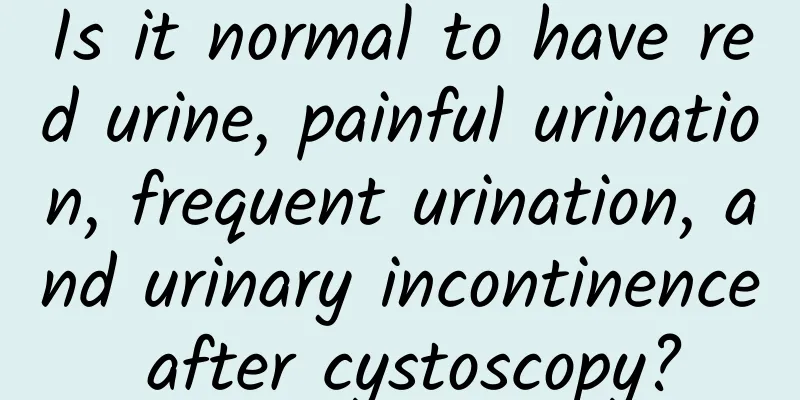Is it normal to have red urine, painful urination, frequent urination, and urinary incontinence after cystoscopy?

|
Author: Xu Tao, Chief Physician, Peking University People's Hospital Reviewer: Song Gang, Chief Physician, Cancer Hospital, Chinese Academy of Medical Sciences Cystoscope is a very powerful device that can play an irreplaceable role in the diagnosis of many bladder diseases. However, after cystoscopy, patients may experience various discomfort symptoms, which patients need to have a certain understanding of. For example, if red urine and pain occur after cystoscopy, the situation should be divided into two categories. Under normal circumstances, the entire urethra and bladder mucosa are tissues in the body, which are very fragile and tender. If a hard metal instrument such as a cystoscope is used for examination, no matter how gentle the operation is or how careful the operator is, damage to the mucosa is inevitable. Therefore, after a cystoscopy, the damage to the mucosa is manifested as mild hematuria and urinary pain. You don't need to be too nervous. After one or two days, the mucosa will heal and the hematuria will disappear. Of course, hematuria may also be caused by other reasons, such as biopsy, which is more serious than simple cystoscopy, so hematuria and urinary pain may be slightly more serious. However, biopsy actually takes very little mucosal tissue, and the resulting wound is only the size of a millet grain, which can heal in a very short time. What we need to understand is that some patients also need to pay attention to severe hematuria after cystoscopy. For example, improper operation causes excessive damage, or the patient has coagulation dysfunction. If severe hematuria is caused by these reasons, it should be regarded as a more important problem. Especially after the cystoscopy, the hematuria is always more serious and even gradually worsens. You should seek help from a professional doctor as soon as possible. Figure 1 Original copyright image, no permission to reprint In addition, some patients may experience frequent urination and urinary incontinence after cystoscopy, which is actually caused by mucosal damage. The human body's ability to sense urine mainly comes from the bladder mucosa, especially the area from the bilateral ureteral openings to the bladder neck, which is called the bladder trigone. The bladder trigone is the most sensitive area in the entire bladder. Its main function is to sense the amount of urine in the bladder and the pressure of urine. When the bladder is held to a certain extent, the nerves in the bladder trigone will sense it and transmit this feeling to the brain, telling you that it is time to go to the toilet and urinate. After a cystoscopy, the bladder mucosa will inevitably be damaged. It is difficult for the bladder mucosa to distinguish whether this damage or stimulation is caused by the damage or by urine. Therefore, it will mistake this stimulation for stimulation caused by urine, and send you some wrong information, saying that you are holding your urine and it is time to urinate, which will cause symptoms of frequent urination. Even after you finish urinating, it will still send you information because it senses the signal caused by the damage. When this signal or stimulation is very strong and frequent, the patient will be unable to hold back urine and suffer from urinary incontinence. Urine comes out before you even reach the toilet. This is actually caused by mucosal damage. However, generally speaking, this situation is relatively rare, because the bladder has its own stability. Even with this kind of stimulation, the urination signal is still transmitted to the brain, so most patients can still control it. Even if it is not controllable, within a day or two, they may quickly adapt to this situation, so this problem will not last long. Figure 2 Original copyright image, no permission to reprint If this problem does occur, it can be treated with medication. For example, a very commonly used class of drugs in clinical practice is called M receptor blockers, which can stabilize the bladder and prevent the bladder from contracting as much as possible. The most common problem with cystoscopy is mucosal damage, which causes symptoms such as urinary pain and frequent urination. The second is the possibility of urinary tract infection. For patients, a very important thing after cystoscopy is to drink more water. Drinking more water can not only promote the timely discharge of a small amount of bleeding, but also avoid the occurrence of infection to a large extent. Therefore, it is generally recommended that patients drink more water after cystoscopy, especially right after the cystoscopy, and maintain a relatively large urine volume, which can reduce a lot of damage caused by the operation. |
<<: How to treat lymphedema after breast cancer surgery?
>>: Is cystoscopy a panacea? What are the risks of the examination?
Recommend
How to detect pregnancy on the tenth day after ovulation
In modern society, we advocate eugenics and good ...
What are the causes of high progesterone?
Progesterone is a type of progestin, and the prog...
Can I have sex on the fifth day of my period?
We all know that sexual intercourse is prohibited...
Will the belly get bigger if you have an ectopic pregnancy?
Many female friends are curious about whether the...
6 things women should know during menstruation: change sanitary napkins frequently to avoid private part infection
The cleanliness of menstrual products is particul...
Women have a trick to fight insomnia
Introduction: Napping during the day may lead to ...
What are the things you need to do after giving birth to a cesarean section?
Many women choose to give birth by cesarean secti...
How should pregnant women increase their iodine intake?
After pregnancy, various trace elements are very ...
How many days does it take for the stomach pain to go away after giving birth?
Giving birth is a very painful but great thing fo...
Don’t just lie down in bed, get moving: Prevention of deep vein thrombosis in the lower extremities
Author: Zhu Congcong Xuanwu Hospital, Capital Med...
How much hcg does it mean that there is a fetal heartbeat or embryo
Pregnant women can accurately judge the fertility...
Can I take 999 cold granules when I am pregnant?
Can I take 999 Cold Granules when I’m pregnant? D...
[Medical Q&A] What are the blood pressure and blood lipid control targets for patients with type 2 diabetes?
Author: Liu Bing, deputy chief physician, Beijing...
Lao Wang is short of breath and has a cold that never gets better. The doctor said it was caused by heart failure. What symptoms indicate that it may be heart failure?
There are currently 13.7 million heart failure pa...
How many days after caesarean section can I be discharged from the hospital
Caesarean section is a relatively common method o...









